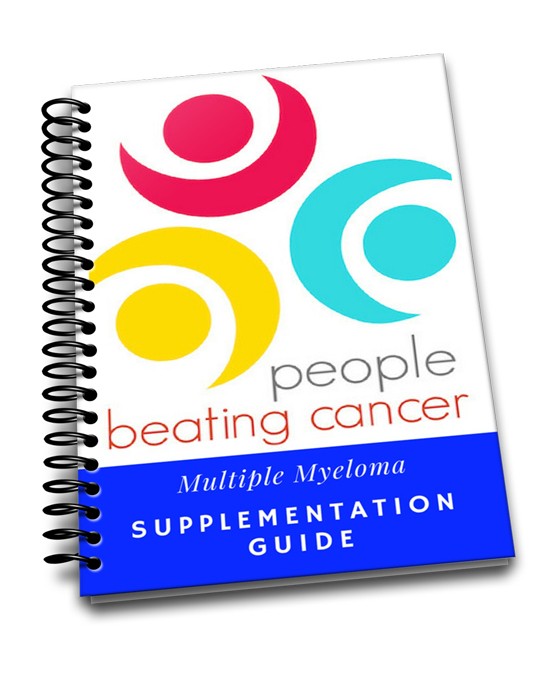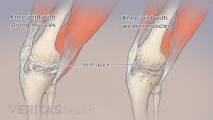
Recently Diagnosed or Relapsed? Stop Looking For a Miracle Cure, and Use Evidence-Based Therapies To Enhance Your Treatment and Prolong Your Remission
Multiple Myeloma an incurable disease, but I have spent the last 25 years in remission using a blend of conventional oncology and evidence-based nutrition, supplementation, and lifestyle therapies from peer-reviewed studies that your oncologist probably hasn't told you about.
Click the orange button to the right to learn more about what you can start doing today.
- You are here:
- Home »
- Blog »
- Multiple Myeloma »
- Arthritis, Multiple Myeloma Therapy Two-fer
Arthritis, Multiple Myeloma Therapy Two-fer

“the treatment with co-encapsulated polyphenols showed the most pronounced effects, where an inhibition of 37–55% was observed between day 16 and 22 after arthritis therapy.”
As a long-term MM survivor, multiple myeloma therapy is a daily habit for me. What I mean to say is, those evidence-based, non-toxic anti-MM therapies (exercise, nutrition, supplementation, etc.) are a part of my daily life. So much so that when my primary care physician told me that my knees exhibited osteoarthritis and then paused, waiting for me to say something…I didn’t know what to say.
Dr. Yasinow took the little rubber hammer, knocked the front of each of my knees several times and calmly announced that I had osteoarthritis in both knees. The doctor was looking at me expecting me to talk about how much arthritis pain I was feeling and could he prescribe some medication for it?
At the time, I had no idea what Dr. Yasinow was talking about.
When I came across the top two articles linked below, I finally figured out why I don’t feel any arthritis pain in my knees. The articles linked and excerpted below talk about how curcumin, resveratrol and omega-3 fatty acids prevent arthritis pain.
I’ve blogged about these three nutritional supplements and how they are cytotoxic (kill) to my cancer, multiple myeloma, for years now. Each are listed in the MM CC program supplement guide. But I knew nothing of their efficacy for arthritis.
My non-toxic, evidence-based, multiple myeloma therapy is also non-toxic, evidence-based arthritis therapy.
If you have arthritis, please read the study linked and excerpted below and please consider supplementing with both Curcumin and Optimized Resveratrol .
“Curcumin as nutritional supplement may help treat cancer, inflammation, ulcerative colitis, rheumatoid arthritis, osteo arthritis, diabetes, depression, anxiety, cognitive function and fatigue, chronic anterior uveitis and other conditions.”
“Resveratrol supplementation may treat cancer, may lower bad cholesterol, may reduce levels of inflammation, improves insulin sensitivity in diabetics, may help memory function and may help prevent the onset of Alzheimer’s Disease dementia and other neurodegenerative disorders.”
Each of the products linked have been tested and approved by ConsumerLab.com. 5% of your purchase is donated to PeopleBeatingCancer a 501c3 non-profit. Thank you.
For more information about nutritional therapies to reduce inflammation and arthritis, scroll down the page, post a question or comment and I will reply ASAP.
Thank you,
David Emerson
- MM Survivor
- MM Cancer Coach
- Director PeopleBeatingCancer
Recommended Reading:
- Multiple Myeloma Diet, Supplementation- A How-To Guide
- Multiple Myeloma Side Effects- Prevent Inner Ear Damage
- Multiple Myeloma Chemotherapy- RVd Triplet “Impressive Response”
A novel approach to arthritis treatment based on resveratrol and curcumin co-encapsulated in lipid-core nanocapsules: In vivo studies
“Abstract- Resveratrol and curcumin are two natural polyphenols extensively used due to their remarkable anti-inflammatory activity…
Fourteen days after arthritis induction, they were treated with resveratrol, curcumin, or both in solution or loaded in lipid-core nanocapsules for 8 days. At the doses used, the polyphenols in solution were not able to decrease paw oedema. However, nanoencapsulation improved the antioedematogenic activity of polyphenols at the same doses.
In addition, the treatment with co-encapsulated polyphenols showed the most pronounced effects, where an inhibition of 37–55% was observed between day 16 and 22 after arthritis induction. This treatment minimized most of the histological changes observed, like fibrosis in synovial tissue, cartilage and bone loss.
This is a promising strategy for the development of new schemes for treatment of chronic inflammation diseases, like arthritis.
Effects of high-dose fish oil on rheumatoid arthritis after stopping nonsteroidal antiinflammatory drugs. Clinical and immune correlates.
“To determine the following:
- whether dietary supplementation with fish oil will allow the discontinuation of nonsteroidal antiinflammatory drugs (NSAIDs) in patients with rheumatoid arthritis (RA);
- the clinical efficacy of high-dose dietary omega 3 fatty acid fish oil supplementation in RA patients; and
- the effect of fish oil supplements on the production of multiple cytokines in this population…
Patients taking dietary supplements of fish oil exhibit improvements in clinical parameters of disease activity from baseline, including the number of tender joints, and these improvements are associated with significant decreases in levels of IL-1 beta from baseline. Some patients who take fish oil are able to discontinue NSAIDs without experiencing a disease flare…
The Most BioAvailable Curcumin Formulas
“Based on a review of these studies, it is evident that better bioavailability of formulated curcumin (CU) products is mostly attributed to improved solubility, stability, and possibly low first-pass metabolism”
A search of the Pubmed database for the word curcumin yields 601 studies spaning health topics from multiple myeloma and colorectal cancer, to chemotherapies that synergizes with CU, to Alzheimer’s Disease, arthritis and more. Based on years of reading studies and personal accounts, I think it is safe to say that CU supplementation is safe and relatively inexpensive.
I have read about myeloma patients taking daily doses of CU from 400 milligrams to 8 grams (1000 milligrams = 1 gram). By almost any measure, CU is a safe, inexpensive wonder drug.
The only challenge is that CU is famously difficult to absorb in the body. In other words, a person has to mix curcumin with some sort of fat (coconut oil, chocolate, etc.) or take a brand of curcumin capsule that is already formulated to be more “bioavailable” in order to derive the full benefit of CU.
The study linked and exerpted below reviews different formulations of CU. The study itself lists the three most bioavailable formulation/brand of CU and I’ve added an excerpt from a further review from Consumerlab.com that lists four additional bioavailable brands of CU.
Recommended Reading:
- CU versus Turmeric as Cancer Therapy-What’s the Difference?
- CU Suppresses Colon Cancer, Enhances Chemotherapy
- Prostate Cancer: CU Curbs Prostate Cancer Metastases, Study Shows
- CU vs. cancer: The scientific evidence continues to pile up
Curcumin
“CU is a bright yellow chemical produced by some plants. It is the principal curcuminoid of turmeric (Curcuma longa), a member of the ginger family, Zingiberaceae. It is sold as an herbal supplement, cosmetics ingredient, food flavoring, and food coloring.[1]“
Bioavailable curcumin formulations: A review of pharmacokinetic studies in healthy volunteers.
“Curcumin is a widely studied natural compound which has shown tremendous in vitro therapeutic potential. Despite that, the clinical efficacy of the native CU is weak due to its low bioavailability and high metabolism in the gastrointestinal tract. During the last decade, researchers have come up with different formulations with a focus on improving the bioavailability of curcumin. As a result, a significant number of bioavailable curcumin-based formulations were introduced with the varying range of enhanced bioavailability.
The purpose of this review is to collate the published clinical studies of CU products with improved bioavailability over conventional (unformulated) CU. Based on the literature search, 11 curcumin formulations with available human bioavailability and pharmacokinetics data were included in this review. Further, the data on clinical study design, analytical method, pharmacokinetic parameters and other relevant details of each formulation were extracted.
Based on a review of these studies, it is evident that better bioavailability of formulated curcumin products is mostly attributed to improved solubility, stability, and possibly low first-pass metabolism. The review hopes to provide a quick reference guide for anyone looking information on these bioavailable curcumin formulations.
Based on the published reports,
exhibited over 100-fold higher bioavailability relative to reference unformulated CU. Suggested mechanisms accounting for improved bioavailability of the formulations and details on the bioanalysis methods are also discussed.”
According to Consumerlab.com:
“Novasol has the highest bioavailability (185 x compared to unforumulated CU), followed by Curcuwin (136 x), Longvida (100 x), Meriva (48 x), BCM-95 (27 x), Curcumin C3 Complex + Bioperene (20 x), and then Theracumin (16 x).”



